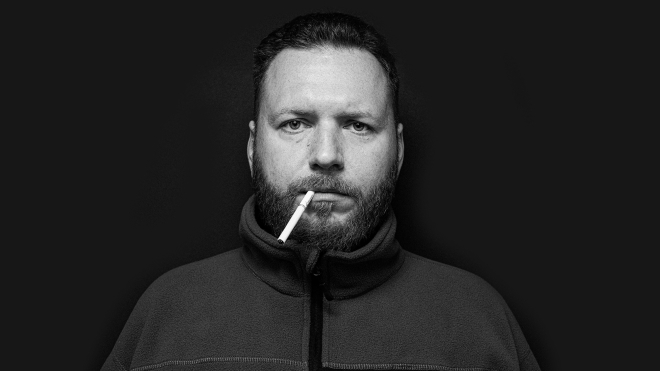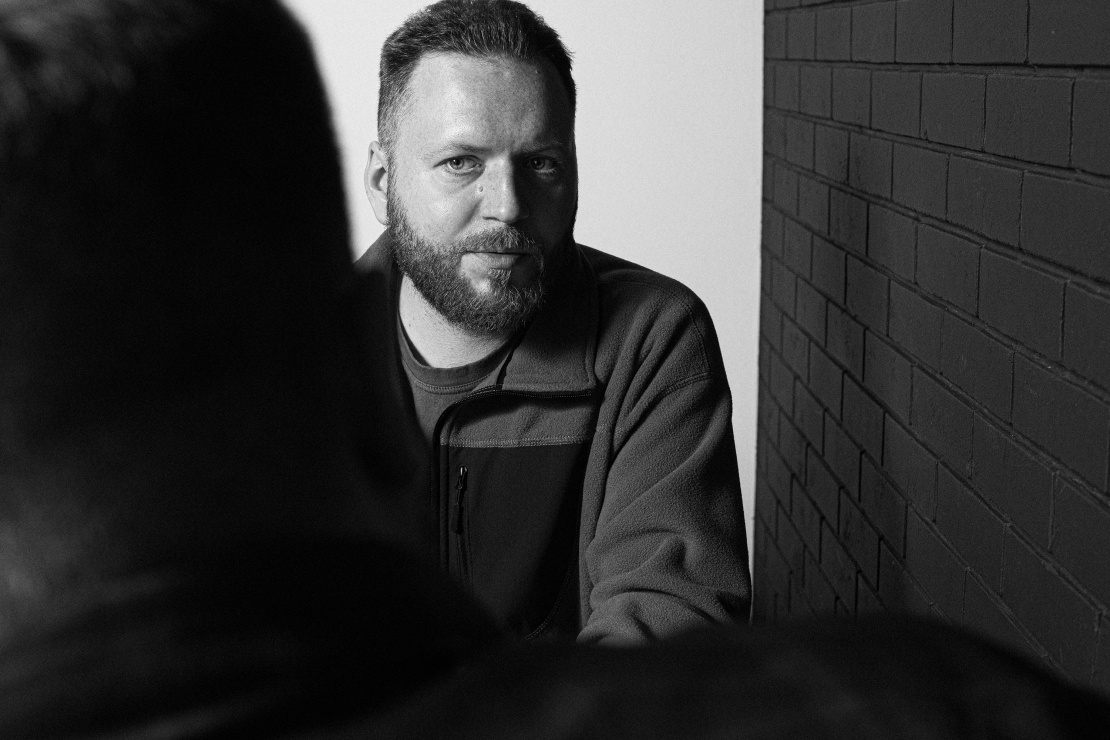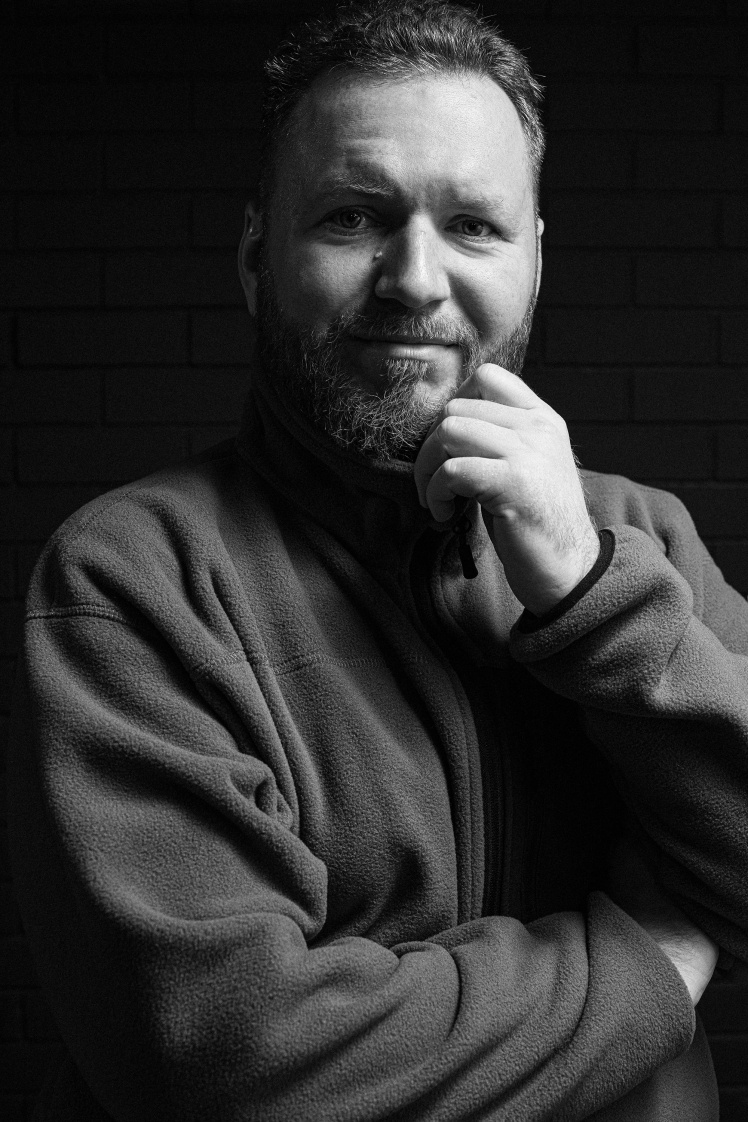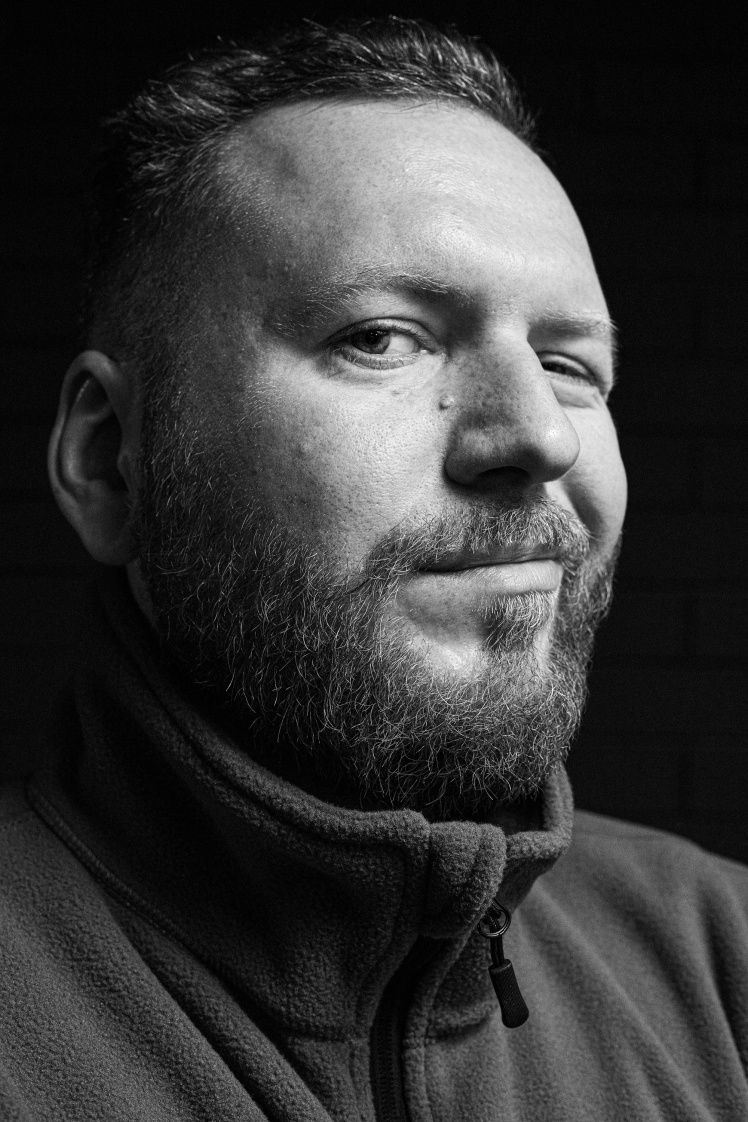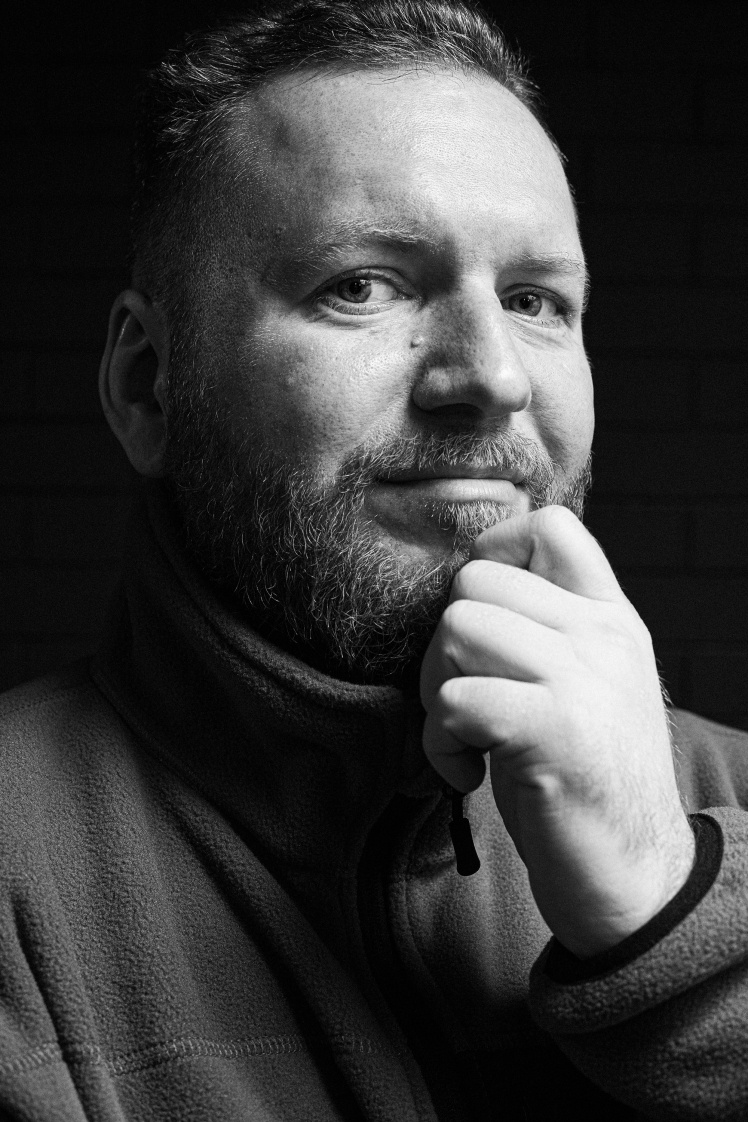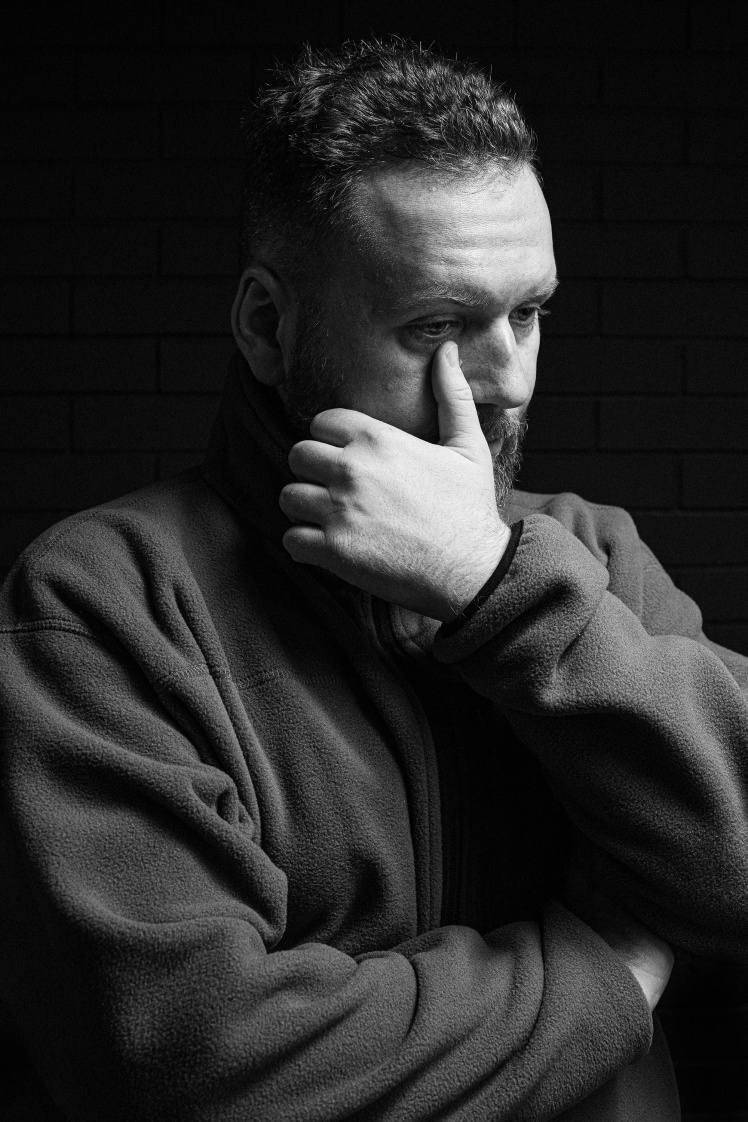You went to the Territorial Defense in 2016, took part in training. That is, you expected that the war would not stop in Donbas?
By 2016, the war had cooled down, and it was unclear what to prepare for. But I decided that it was necessary to prepare. Although I was sure until February 24 that there would be no full-scale invasion, that it would be limited — to Donbas, to the south. I thought: they arenʼt idiots to push from the north to Kyiv, to Kharkiv, they just wonʼt be able to cover everything. And they didnʼt, but they still will drink a lot of blood.
Why did you think then that they wonʼt be able to capture everything?
I am not a general, not a military expert, I didnʼt graduate from a special school. I simply relied on open data and estimates that with such logistics and such equipment, they could attack from the north, but they would choke. And thatʼs what happened — people were simply sent to their deaths.
But the mistake was that we looked at this scenario rationally. Because the Russians captured Crimea rationally — carefully, cleverly, they chose the right moment. With Donbas [in 2014] it was also rational because they had a clear goal: to prevent Ukraine from developing, to slow it down, to drag it back [to Russia]. And itʼs tricky: it seems that there is Russia in Donbas, but officially it isnʼt there — it just helps to “settle the internal conflict”. And in 2016, it seemed to me that they have so much strength and rational plans that they can sweep us to hell if they want. And we should prepare for that. At least in Donbas and the south. So I was preparing.
And the Russians began to act irrationally?
You have a gun, but no ammo. Itʼs rational that you wonʼt run with it and poke at people. Because sooner or later everyone will understand that there are no bullets. But thatʼs not a city madman — this is Russia, Putin, the Kremlin. They have to understand something. And it turns out that they donʼt. They invented a propaganda picture and believed in it themselves. Intelligence from the FSB about Ukraine simply copies the propaganda. No one conducted any real intelligence work. The Russians convinced themselves that we have a junta here, that fascists will turn everyone into LGBT persons, take away children and give them to gays.
Letʼs get closer to your experience. I came across the opinion that war writers are divided into two large categories. There is a conditional Remarque, who was at the front for a short time. And all that he endured was horror and hopelessness, which he later wrote about. And then there is the conditional Jünger, who wrote about the war much more calmly, although he went through the First World War from beginning to end. And the key here is the amount of time spent at the front. How did your feelings in the first months of the war differ from today?
Yes, they differed significantly. Right now Iʼm rather a Jünger than a Remarque. The very first combat sortie at the end of May was a complete hell. We licked our wounds and thought, "What a horror it is."
In March and April, we didnʼt participate in almost anything. I got to Irpin when there was no one there already, it was just my turn. And we hung out, talked to locals and caught cellular connection from high-rises. And in May it was a true war — on a clear field, with positions, tanks, infantry, all these things. All this we experienced already in the Kharkiv region.
On the next combat tour, I was horrified again. And after that it became calmer. The most terrible things Iʼve already experienced in the village of Dementiiivka. We were sent for 3-4 days just to support the other unit so that they know that they have mortars. It was quite calm there then. We arrive, and there is the damned Stalingrad, an artillery range. No one knew that this would happen. Plans change literally in a few hours. All further combat missions took place more calmly. With confidence — we know what we are doing, we know how to work, weʼve already seen everything.
One of my acquaintances compared our life to a summer camp. We listen to music when we prepare food, we play Heroes 3 on the computer in turn, when there is time and opportunity. With the breeze, with songs, with jokes, we go on our positions. In the same way, we come back with jokes. True summer camp, only with increased risks.
Does it get scary?
When we first got into fierce fighting, I realized what is the biggest fear that can be on the front line. It isnʼt the fear of dying, not the fear of the enemy, not the fear of shelling. Itʼs unknown. You donʼt know what will happen. You donʼt know where your commander is, what is happening, you have no communication. And you have to sit still and somehow react to it all. But how to react? Everything explodes everywhere, and you canʼt find any of your guys. So here we are, five underdogs from different units, sitting in a pit, waiting for the mortars to stop working on us. And what to do next is unclear.
But then, however, everything got better. We learned to understand maps and the area, we established communication. After the first negative experience.
So the situation is much better now?
I can only judge by my unit, I donʼt know how itʼs in others. Some have it worse, some have better. But it seems to me that now every unit is on about the same level.
By the way, what can I say about Territorial Defense: this project actually failed, it didnʼt become what it should have been according to the law. TrD should have an administrative link to the residence permit, to the district where you live. But the authorities didnʼt have time to build the system, the invasion began, and people were recruited randomly. I donʼt have all the information, but according to my feelings, the military leadership simply dropped this idea and decided to make the Territorial Defense a light infantry, from which not much is demanded and to which much is forgiven. For example, we walk around with beards, there is freedom in our clothes.
And this is not welcomed in the army?
In a regular army sometimes yes, sometimes not.
But is it easier for commanders to press on the regular soldiers, right?
On the front lines itʼs not the case at all. But in the rear, this may happen. This is one of the most unpleasant factors when you come from a war zone, after all this shit, and they start telling you that this is an army, not a kindergarten, so letʼs be smart and stay in line. Misunderstandings arise between different military. Between those who took great risks and those who did organizational work. You have to put yourself in each otherʼs place, understand who did what. I understand that some soldiers donʼt fight, but are engaged in organization of a lot of things — and thank God. This is also necessary, you canʼt get anywhere without it.
Another thing is when an officer thinks: “Okay, soldiers, I have to show them what service is, as I have five hundred years of experience there, so I can write the rules with my eyes closed.” An unnecessary conflict begins.
But in Territorial Defense mostly no one bothers about this. Things like rank or position have relative weight. If you are a commander, people donʼt obey you just because you have the status. Your job is to receive information and distribute it. Itʼs not that you get obeyed, itʼs just the order of work. And if you start arrogantly talking to people, tell them how to live, then you will be sent far away. Therefore, the positions of people are absolutely equal.
I hear a lot of talk about inequality in other ways — someone is fighting in the trenches, and someone is sitting on warm sofas, especially the wealthy, children of lawmakers, etc. Should the conditional son of Petro Poroshenko sit in the same trench with you, or do you not care?
I generally donʼt care.
That is, all these conversations are the games of civilians on Facebook? No one thinks about this at the front?
I didnʼt hear such conversations at the front at all. There was no such resentment that we are suffering here, while they over there in Kyiv are having fun. The level of understanding of the problem is many times higher than eight years ago, when the war began. Then, in 2014, I also didnʼt fully understand what was happening, how to react to it, and what would happen next. Now everyone understands everything. We donʼt fight because we were sent here. Neither because we hate Russians. Itʼs just that if we donʼt do this, everything we value and love, everything weʼve achieved over the years, will come to an end.
How do you feel about defectors trying to cross the border? Do you care about this?
I personally can feel whatever I want about it. A person makes such a choice, I can morally condemn him, but this is my personal assessment. And Iʼm not sure that not letting men go abroad is a super good idea. But I understand that we are under martial law and must have a mobilization reserve. It shouldnʼt be lost. On the one hand, if all the young and healthy leave, only the grandfathers will remain. On the other hand, we already have enough people [in the army]. Many soldiers are not yet fighting, but are waiting to be allowed to fight. It seems to me that not letting men go abroad is rather bureaucratic inertia than a rational decision.
That is, an attempt to solve a more complex problem with a simple bureaucratic decision?
War is a simple, unambiguous thing. They kill us and we kill them. There is no variety of options. Warriors are people who came and took a position, they have means of defeat, they have weapons. As it was thousands of years ago: people with sticks came, stopped and thatʼs, now we stand here and fight. Humanity has not gone far from this. Yes, now there are completely different technological means, not sticks anymore, but the essence remains the same. We need people who will physically come and stand in front of the enemy. The same with the mobilization reserve. The world didnʼt come up with anything else. Volunteers are cool, but they run out sooner or later.
And there is another point — many people arenʼt afraid of war, they would even like to fight. They see themselves as soldiers, but itʼs difficult to make an effort of will. And mobilization simplifies it. You have a family, a job, some other things. You canʼt just say, “Thatʼs it, Iʼm going to the front.” You will think later that maybe you should have stayed with the children.
Mobilization solves the dilemma.
Yes. Mobilization is not necessarily that you are being pulled while digging your claws into the ground. The ban to leave the country is part of a completely stupid, but necessary machine. War is stupid. And its means are also stupid. You wonʼt do anything here.
Therefore, when someone tries to cross the border in a baby carriage or in a womanʼs dress, I treat this simply as a mathematical probability. Conditionally there are a thousand people who want to leave the country, one or two of them will try to do it in a shameful way. You can laugh at it, you can condemn it. But this happens and will happen.
Do the military feel the support of the rear?
For example, I strongly felt at the beginning of the war how many really true friends I have. How many people who support me are willing to sacrifice a part of their comfort in order to help. It is certainly felt. We have been successful for a long time and are now successful exclusively thanks to volunteer initiatives. Because war is total and resources are limited. At first, nothing was fixed, even the banal tailoring of uniforms for such a large number of soldiers wasnʼt in place. Therefore, certainly, civil support is one of those pillars that hold us together and qualitatively distinguish us from Russia. Because it is impossible there. Not because they are angry, greedy, but because we have a completely different perception of war. For us, war is a situation in which they want to soak us all. Itʼs only pacifists who say that it was necessary to surrender, and then everything would be quiet and peaceful, Mariupol would be intact. And where is there any guarantee that we would be treated nobly and humanely? No, we would have a bloodbath.
Does it make sense to ask people of which professions or social background fight better?
It seems to me that the command has thoughts on this matter. The command likes engineers, people of exact mathematical sciences or with experience in management, administration, at least buying and selling, all kinds of things like that. But when artists and teachers appear, it can be felt that the management is disappointed. That it would like to see an engineer in your place, because it believes that he [or she] will cope with the tasks better.
And will they cope with the tasks better?
I believe that absolutely everyone copes with the tasks. Some are better, some are worse. It depends on the circumstances. But war is such a thing that if you donʼt know how something gets done, you will learn. And if you know, then you will start doing it even better.
Is the language issue at the front as acute as at the rear?
According to my observations, many people switch from Russian to Ukrainian. These are people who know both languages well. Itʼs just that now they have turned off the Russian language option and are using Ukrainian. There are people who hardly know Ukrainian at all. Or they try to speak, but they donʼt succeed and they switch to Russian. There are very few, just a handful of people, for whom happiness will come only when everyone speaks Ukrainian. That then the enemy will leave everything and run away. In Jaroslav Hasekʼs Adventures of the Brave Soldier Švejk there was such a “toilet general” who believed that if the soldiers pooped in the morning, afternoon and evening according to schedule, the enemy would flee in horror.
I now have an Azerbaijani colleague at a new place of service. Even his Russian isnʼt always understandable. But somehow we understand each other, like it or not, you find a common language. So the question is no longer what language is spoken, the main thing is that this language is understandable.
How do you think our army differs from the Russian one now?
There is an important point. Russians have no vital need to fight. There are, of course, enthusiasts who just want to chop off heads. But mostly Russians have no interest. In our case, you sit in the trench and think: I would like to go home now, take a warm bath, get myself clean. But if I donʼt stand here, my home may be destroyed, and there will be nowhere to return to. The Russian doesʼnot have such limitations — his home is not threatened. It is much easier for him to say: “Oh, to hell with it, Iʼm done with the war.” Their attitude towards it is simpler. For them, war is only an opportunity to earn money, to become someone, to make at least some kind of career.
In Ukraine, much depends on social consciousness and initiative, on internal self-organization. Network-centricity is our current doctrine. There is the General Staff, there are brigade headquarters, battalion headquarters, etc. The command is given by the brigade, and this command is carried out by people on the ground, but they are not led by the hand. Already on the ground, it is assumed that there are opportunities to fulfill the order. Junior commanders have a lot of room for maneuver. Because the one who is directly on the battlefield knows better.
But does this contradict the Soviet military doctrine, where decisions came down the chain from above?
This is what happens in Russia. Everything is strict, there is no self-activity. No disputes between commanders. Here, for example, one officer gives a command to another officer. And he does not agree with him, so he says: “No, if we do it like this weʼll die, so we need another way.” Or that they have not enough combat power. And this is where the trade begins: “If we get you something more, then can you do it?” That is, people begin to agree, to look more realistically at the goals and objectives of the war.
And for the Russians, everything is simple: do as they were ordered, “capture Kyiv in three days.” They drive in giant columns and burn on the road. Such a system doesnʼt work well, as practice shows. Besides, the Russians have no goal. War is a way to achieve political goals without making concessions. And their only vague goal is to show the whole world what they can do to others. Like, thatʼs what will happen to anyone who does what they donʼt like. But this is not the goal, you canʼt fight for it.
What is globally wrong with Russia and Russians? We had a lot in common with them during the Soviet period.
This is a question of political identity. It seems that everything is the same: our work and economic systems are similar. The path of life seems to be one and the same. But the approach to it is different.
A Soviet person, be he or she from Ukraine or from the regions of Russia, in order to touch civilization had to get to the metropolis. Ideally, go to Moscow, where there is sausage, fur coats, boots, and so on. We got rid of this in the 1990s. What our people had to go to the center and humiliate themselves for, we now have. And we donʼt need to adapt, do things we donʼt want to do, to have access to benefits.
In Russia itʼs still like that. Moscow remains the center to which itʼs necessary to adapt. And the distribution of resources is according. All tax flows go to the center, and there is nothing in the regions.
If it were not for the existential crisis of the 1990s, we and the Russians would be similar people. With a similar household culture, habits, and lifestyle. But the issue of political choice — who you are with, who you are for and against whom — it turned out to be decisive. And it began to transform our culture beyond recognition. If you compare Russians and Ukrainians in the early 2000s, there was a big difference even then.
And now itʼs even bigger.
And now this difference, itʼs just... Thereʼs no point in even comparing how different we are. That is, the community of faith or language learned in the school of culture is no longer of significant importance. The Serbs and I are also Slavs, Orthodox Christians.
We both use the Cyrillic alphabet.
Right. And what? Where are the Serbs, and where are we? Itʼs the same with the Russians.
That is, the political choice turned out to be more important than all others.
Yes. Even after 2014 [when Russia annexed Crimea and started the war in Donbas], there were many people who said: “There is no war, the Russians are brothers. Letʼs be together, everything is cool, Orthodox, understandable.” And now everything has changed. Because they saw with their own eyes what was happening, felt it on their skin. Political choices are made, not because of force, but out of necessity. And these people began to move to another camp — for independence, for progress, for complete separation from Russia. The most interesting thing is that this process is painless, many people who are fighting now could be called typical Soviet people in the past. And there is still a lot of Soviet or Russian in their household culture.
Russian vibe.
Yes. But it doesnʼt affect anything except aesthetics. They listen to such songs, speak such a language and thatʼs all. And their political choice is completely different [from Russiansʼ].
Do you think that digging into who voted for whom 15 years ago is redundant now?
It doesnʼt even matter who voted for whom three years ago. When everything is fine and you voted for someone, no one will care much about your choice. And when things get bad, people immediately start asking: “Why did you vote for him [or her]? You see how bad it has become.” Then itʼs OK again and people calm down. This is absolute nonsense.
The Russians are torturing our prisoners, we know it, there is video evidence. Could you torture a Russian?
Torture, in principle, is not our method. Perhaps this is what they are doing somewhere, but secretly and on a limited scale, with especially “important” prisoners.
Iʼm not talking about the real dimension, but the moral one. Are you closer to “tooth for tooth”, or you need to save your human face?
But why do it? Thatʼs excessive violence. If I knew that this particular person had done something bad, killed our people, it would have been one thing, but you never know.
But if you know? You know about someone specifically that he tortured Ukrainian prisoners of war.
Then you need to look at the circumstances. You can never tell in advance. Usually you donʼt know what this or that prisoner became famous for. You donʼt know if heʼs lying or telling the truth. He can say anything, your task is to save him so that he doesnʼt bleed out, and transfer him to where he needs to go. In order to exchange for our people. I donʼt want to say the phrase “thereʼs no need to spoil the product”, but just why [torture someone]?
Itʼs just that if you go to Facebook, you will see a lot of comments by civilians that you should do the same as the Russians do, you should treat them worse, etc.
Until itʼs time to do something — everyone is brave. In the rear, all the soldiers who have not yet been fired on seem to be cool. And as soon as they get into combat conditions, their picture of the world begins to adjust. Not everything is so simple, easy and fun. The very essence of war, we have already talked about it: some people with weapons kill other people with weapons. And then these soldiers come back and become quieter. And sooner or later, when these people do their work for a long time, they cease to have any emotional attachment to the enemy. The enemy is not someone whom I directly hate. This is just the target. And we have to complete the task, take this territory. In order to get it, we need to knock out the target, hit it, kill it, if thereʼs no other option. You can rejoice when it turned out well for you. You are informed that your projectile hit hard and killed everyone, you did a good job. But there is nothing personal about it, it is quite detached.
For a long time, I thought about how I would feel when I would shoot at living people, not from a mortar, but from a small-arms weapon. And it turned out that I feel relieved, because I recovered from the week of inhumane conditions that the occupiers gave us. They showered us with all kinds of weapons, and there was a small opportunity to shoot someone, because they were in the wrong place at the wrong time. They you get such a feeling as if you shit on someoneʼs doorstep. An easy satisfaction. But there is no bloodthirstiness in this.
Donʼt you feel that you have become a crueler person?
No, sometimes it seems to me that I have become softer, on the contrary. Began to treat people with understanding.
And what is the mechanism of your changes?
This will be determined by my psychotherapist when I am demobilized. Now it is difficult to get into it, because a mobilized consciousness is different from a relaxed one. Many processes have a delayed effect. For example, the perception of death. At first, you perceive it acutely, you are worried about the death of your friends. And then you enter the usual rhythm of life. Yes, the boys died. And we could die. They died today, and we will die tomorrow. Or maybe we wonʼt die. And all this dispels the ritualization of death.
Does the fear of death remain?
I already said that the fear of the unknown is worse. And death... You perform your tasks, it can happen mechanically, instinctively. Then, perhaps, you will think about what happened, cry, and relax. Or you wonʼt. But what we know from the experience of our fellow citizens, in general from the world culture associated with war, is that stress always piles up later. And we have to be ready for it. We have to monitor mood, monitor feelings.
People say that war veterans are divided into two large categories: those who wear their uniforms for a long time after the war, and those who take them off on the first day of peace. What type do you think you are?
I would like to get rid of all this as soon as the war is over. And to live the usual beloved life. To do only what I want, at the time I want and with the people I want. And donʼt look back at the service, that you have to be somewhere, have to do something, and you donʼt want to. I think every soldier has such a desire. In the army, you have to live with people not because you love them, but because thatʼs how you were assigned. It is not always pleasant. So I came home on vacation and the first thing I did was to change into civilian clothes and go to a bar with my friends.
You were an anarchist. And you are still asked, I see on social networks, how does an anarchist wear a uniform? Iʼm not asking what you answer to them. How do you explain it to yourself?
There are two approaches to oneʼs own political beliefs. One is radical, literal. If we talk about anarchists, the state is unnecessary, power is unnecessary, leadership is unnecessary. We cancel it all. We live in a new way, without all this. And we make sure that what we donʼt like does not appear.
And there is a more realistic, more philosophical approach. When you consider your political ideal as a horizon. That is, you understand that it would be cool if it were just like that. But I cannot come up with a socio-political system and make it so that we all start creating it. And it still wonʼt work. Life consists not only of work, leisure, attempts to vote on the budget, share income, decide what to build where, who should have how much food. There are still wars, conflicts, moments of crisis. And no one has yet come up with anything better, except to organize everyone together in moments of crisis and achieve a specific goal under a common banner.
A thousand autonomous groups will not be able to defeat Russia. A single centralized mechanism is needed, which accommodates hundreds of thousands of people, tools, data, information, produces a general strategy, tactics, approaches, doctrine. Each individual would not be able to cope with this and accumulate so many resources.
When you sit in Kyiv, sometimes the level of nuclear paranoia goes over the top. Are nuclear weapons being discussed at all at the front or not?
Sometimes people discuss. But I did not notice any particular tension. If the Russians will use nuclear weapons, then only in large cities. Otherwise, whatʼs the point?
And tactical nuclear?
Why use tactical nuclear weapons in the front line, if a better effect can be achieved with conventional weapons? It is much cheaper and easier to launch a Caliber missile, and there will be nothing for it. Hit a legitimate military target with a legitimate military weapon. And nuclear weapons are a violation of the rules, a last resort. Well, 150 people will die in the trenches, the territory will be contaminated for a certain time, a large crater will appear. And what? You simply wonʼt have enough nuclear charges to knock everyone out of their trenches.
Do you think the West will respond?
Not only we will suffer, all of Europe will suffer. The whole world will suffer from it. Because the radioactive dust will simply fly to Europe, somewhere else — to Africa, to the Middle East, to Asia, everyone will be unhappy.
If they decide to bomb us with tactical nuclear weapons, it will be cities. Because it is spectacular, a beautiful picture can be shown. But what military advantage does this give? The fact that Kyiv is in a panic? But the military remains in positions, logistics continues to work. The General Staff does not sit on Khreschatyk, it is decentralized. You will not be able to calculate where all the most important people will gather to kill them. We donʼt have a mobile Kremlin.
Therefore, it is absolutely irrational to use nuclear weapons. But again, attacking us on February 24 was also irrational. It was irrational to include four Ukrainian regions in the Russian Federation. However, they did it. And now on their posters with slogan: “Donetsk, Lugansk, Zaporozhye, Kherson, Russia!” the name “Kherson” is covered with tape.
Translated from Ukrainian by Anton Semyzhenko.
We know for sure that it is rational to support each other. Support Babel: 🔸 in hryvnia🔸 in cryptocurrency🔸 Patreon🔸 PayPal: [email protected].
